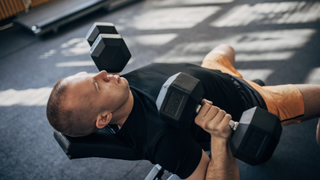ActiveWorkoutsNo stupid questions: Can you work out every day?Is it a good idea to pump iron or do cardio training every single day? It isn’t; here’s what to do insteadWhen you purchase through links on our site, we may earn an affiliate commission.Here’s how it works.
ActiveWorkoutsNo stupid questions: Can you work out every day?Is it a good idea to pump iron or do cardio training every single day? It isn’t; here’s what to do insteadWhen you purchase through links on our site, we may earn an affiliate commission.Here’s how it works.
Is it a good idea to pump iron or do cardio training every single day? It isn’t; here’s what to do instead
When you purchase through links on our site, we may earn an affiliate commission.Here’s how it works.
(Image credit: Getty Images)

(Image credit: Getty Images)
The short answer is no, you can’t, especially if you haven’t exercised vigorously for a while. Exercise puts stress on your body, and if your sleep and recovery aren’t on point, you won’t get leaner and stronger – you’ll get injured instead.
Most fitness experts recommend incorporating rest days into your workout routine to allow your muscles time to recover and repair. According to the American Council on Exercise (ACE), beginners should aim for at least one day of rest between workouts to avoid overtraining.
As you become more experienced and your fitness level improves, you can gradually increase the frequency and intensity of your workouts, but it’s still important to include regular rest days.
Maybe I shouldn’t exercise at all, then?
We’re not recommending you not exercising, just to clarify. Resistance training – any exercise that gets you moving against resistance, whether it’sdumbbells,resistance bands, or your body weight – offers numerous non-aesthetic benefits that contribute to overall health and well-being.
One of these is improved strength and muscle mass, which can enhance physical performance in daily activities and reduce the risk of injury.
Resistance training hasbeen shownto increase bone density, reducing the risk of osteoporosis and fractures, particularly in older adults. It can also help improve joint health and mobility, enhancing flexibility and reducing the risk of age-related stiffness.
Sign up to the T3 newsletter for smarter living straight to your inbox
Get all the latest news, reviews, deals and buying guides on gorgeous tech, home and active products from the T3 experts
Resistance training also haspositive effectson metabolic health, including increased metabolism, improved insulin sensitivity, and better blood sugar control, which can aid in weight management and reduce the risk of chronic diseases such as type 2 diabetes and cardiovascular disease.
The list quite literally goes on and on and on.
(Image credit: Getty Images)

(Image credit: Getty Images)
Let’s get this party started
The best way to tackle frequent workouts is to ensure you don’t work the same muscles using the same workouts every day. Fitness has many sides, and if you truly want to become fit, you’ll have to do more than just pack on muscles.
On that note, we put together a very simple weekly workout routine to give you an idea of what we meant.
Remember to listen to your body and adjust your workout routine as needed. If you’re feeling fatigued or experiencing excessive soreness, it’s important to take a break and allow your body to recover. Be sure to incorporate proper nutrition, hydration, and sleep into your routine to support your fitness goals.